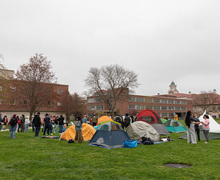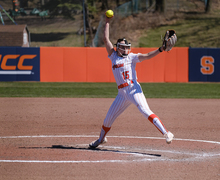Environmental advocate to speak on community engagement potential
‘Green the Ghetto and How Much It Won’t Cost Us’
Who: Environmental justice advocate Majora Carter
What: First University Lecture Series speaker
Where: Hendricks Chapel
When: Today, 7:30 p.m.
How much: Free
Environmental justice advocate Majora Carter will explain how going green isn’t a fad reserved for rich people during a speech Wednesday in Hendricks Chapel.
Carter, founder of Sustainable South Bronx, will present the lecture ‘Green the Ghetto and How Much It Won’t Cost Us’ at 7:30 p.m. as the first lecture in the annual University Lecture series. This year’s lecture series is part of Syracuse University’s push to get students to think about issues relating to the city of Syracuse.
Carter will outline her personal history, including accomplishments and failures, in the field of local economic regeneration, said James Chase, vice president for marketing and communications for the Majora Carter Group and Carter’s husband.
Carter is interested in showing students — tomorrow’s planners, demographers, social workers, engineers or elected officials — how communities of all kinds can work together for a common goal. She aims to influence citizens to embrace the potential of real community engagement, he said.
‘Because her work is pioneering and groundbreaking, she does not expect it to stand on its own,’ Chase said. ‘It is an example to set for others to learn from more than anything else.’
Carter enjoys talking to students because of their flexibility, as they are less set on how things ‘should’ or ‘can’ be done, Chase said. Carter hopes students will take her work and build on it in ways she cannot imagine.
Majora Carter’s grassroots environmentalism and entrepreneurship, which she used to revitalize challenged neighborhoods in the Bronx, are traditional academic strengths at SU, said Esther Gray, special assistant for academic affairs. The similarities of Carter’s grassroots tactics to the approaches of the city of Syracuse and SU of urban revitalization are another reason why she is a fitting choice for the lecture series.
Carter will also touch on ways her consulting firm is developing urban micro-agribusiness models that allow year-round production for institutional buyers. Carter’s method lets regional growers tap into markets from which they were once excluded by increasing their seasonal capacity with indoor growing and employing out-of-work urban residents.
‘Ms. Carter is known to be a compelling presence, dynamic presenter, productive activist and influential intellectual,’ Gray said. ‘Her messages are not only powerful in themselves, but vital for students of every discipline, of every future profession, from every part of the country and every corner of the world.’
Carter’s visit to the university is fitting because of the presence of the Syracuse Center of Excellence for sustainable community solutions, said Carissa Matthews, an outreach program manager for the Environmental Finance Center at SU, which is affiliated with the Center of Excellence and works with the Environmental Protection Agency to develop sustainable communities.
‘Syracuse Center of Excellence looks to Majora as a thought leader in green jobs and environmental justice issues,’ Matthews said. ‘In many ways we can connect her work in the Bronx to a model we are working to replicate in neighborhoods in Syracuse, such as the Near Westside.’
Carter has a positive perspective on environmental issues that are usually portrayed in a negative fashion, said Lisa Ruggero, a senior who views Carter’s outlook as ‘contagious.’
‘She’s extremely inspirational, one of my role models,’ Ruggero said. ‘I’m an environmental communications major, so fighting for environmental justice is very important to me.’
Ruggero said she plans to attend the lecture and hopes the talk will lead more students toward environmental communications.
‘Students would definitely be inspired by her,’ Ruggero said, ‘and hopefully do more work in this field.’
Published on September 19, 2010 at 12:00 pm




